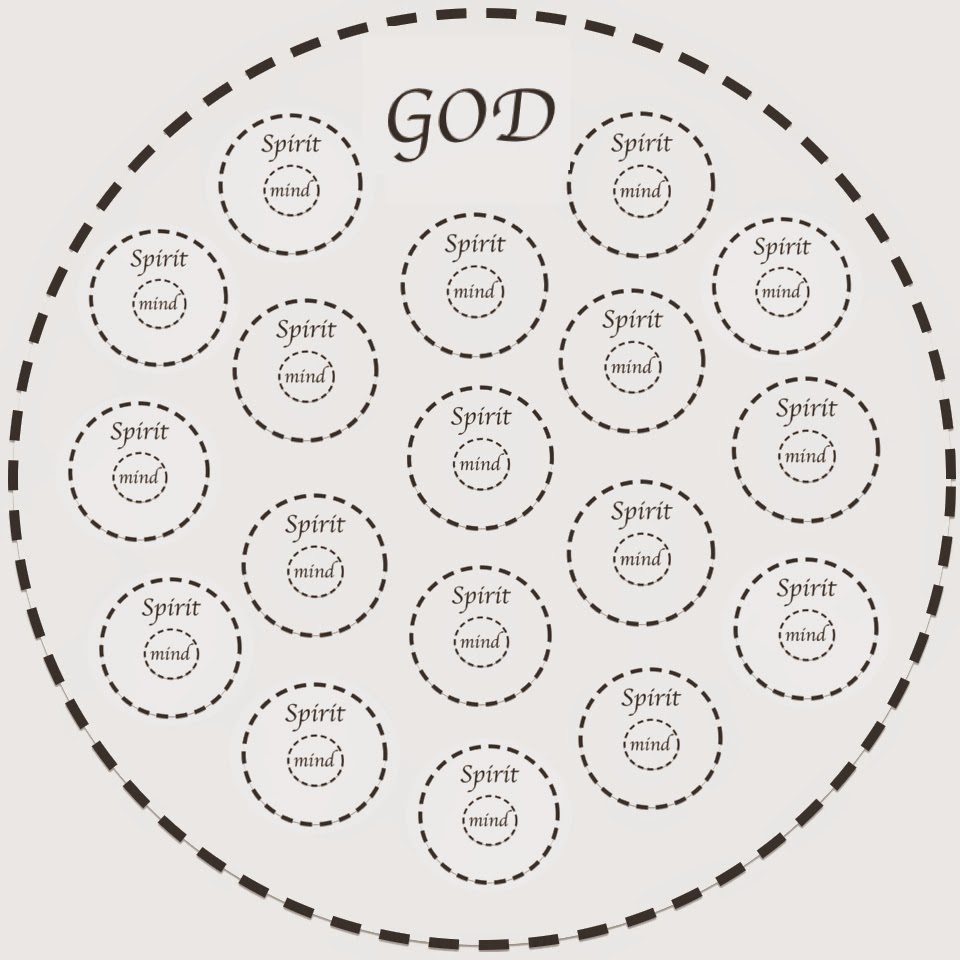Since the age of fourteen I have believed that one’s True
Self is—in a word—Spirit. Yes, you have a body, but that body is not the True
You. You have a thinking mind, too, but that thinking mind is not the True You,
either.
Your True Self is a spiritual energy that continues to exist
apart from your physical body, and continues to exist apart from your thinking mind.
It is an energy that is eternal, and it is an energy that is awake and aware. Said
another way, the True You is an Eternal Spirit that will always be, and, in
fact, has always been. Your current body and mind are just temporary, outward aspects
of the Eternal You—much like the clothes you put on each day.
This description of one’s true nature is not something I heard
or read and then adopted. It is something I instantly understood when I directly
experienced my True Self during a spontaneous mystical experience I had when I
was fourteen years old. I experienced myself being a Spirit in this world, but not of this world. And even though I can
easily get caught up in my thinking mind, and totally preoccupied with daily
life, since that day I have never lost the sense that behind my thoughts and
behind my actions there is a Spiritual Essence enjoying the experience of just being
alive and in the physical world.
The true nature of one’s own being, however, is not the only
thing I came to understand during my brief, but profound experience. I also
came to understand something about the nature of God: Namely, that God is not a
“being” per se, but is a creative, intelligent energy that permeates every
corner of the universe and everything in it. What I didn’t completely grasp as
a fourteen-year-old, though, was the exact nature of the relationship between
my individual Spirit and that Divine Energy we call “God.” I guess you could
say my mystical experience was somewhat incomplete, because I didn’t have what
many people call an experience of “oneness” . . . a sense that everything in
the universe—including the energy of God and the energy of my own individual
Spirit—is intimately intertwined.
It wasn’t until many years later that I came to see that relationship more clearly, through a series of simple diagrams that—in a moment of divine inspiration—suddenly occurred to me. What follows is how I have personally come to picture the relationship between God, Spirit, and the thinking mind.
Let’s start with a simple diagram illustrating the
relationship between God and one’s own individual Spirit:
In this diagram, the large circle represents God. Of course,
God has no borders. That’s why the circle is composed of dashes instead of a
solid line, indicating that the energy of God cannot be contained. Throughout
the universe—and all of its various dimensions—the energy of God is ever-present
and everywhere-present. As one ancient philosopher put it:
“God is an infinite sphere, whose
center is everywhere,
and whose circumference is nowhere.”
The smaller circle represents your individual Spirit. As
indicated in this diagram, your Spirit exists within the energy of God . . . and naturally so. Where else could
it be? Nothing exists outside of God, for God—as some spiritual teachers put
it—is “All-That-Is.”
Notice, too, that in this diagram your Spirit is also composed
of dashes instead of a solid line, indicating what is perhaps the single most
important aspect of your true nature: The fact that there is absolutely no
separation between the energy of your Spirit and the energy of God. Your Spirit
is as inseparable from God as a wave is from the ocean. In effect, your Spirit
is an individual expression of God—a concentrated point of God’s consciousness.
In my talks, workshops, books, and posts, I am constantly
talking about the importance of getting in touch with your Spirit if you want
to stay “in the divine flow.” And now—via this diagram—you can literally see why.
When you connect with your Spirit you are also connecting with the all-encompassing,
all-knowing Mind of God, and can benefit from its wisdom and its guidance.
But something is missing from the above diagram. What about
that part of you that “seems” to be you even more so than your body? I am
talking about your thinking mind, with its nonstop thoughts and ever-growing
collection of memories. Where does your thinking mind fit into the picture? To
answer that question, I present a second diagram:
Just as God contains an element that is part of God, but not all
of God (your Spirit), your Spirit contains an element that is part of your Spirit, but not all of your Spirit (your thinking mind).
Your thinking mind—your conscious mind, or what is sometimes referred to as
your ego mind—is the part of your Spirit that experiences the physical world
through the body and its five senses. To your mind, the physical world seems to
be a world of separation. This mountain is separate from that mountain. This
flower is separate from that flower. This person is separate from that person. But
notice that in the above diagram, your mind is also surrounded by dashes
instead of a solid line.
This indicates that your mind is not meant to continually experience a sense of
separation from everything it perceives. Your mind is also meant to experience
“oneness” with your Spirit, and thus, oneness with the All-That-Is that is God.
Unfortunately, very few people experience that kind of spiritual unity with any
regularity. Most people are so engrossed in their own thoughts, and so preoccupied
by both the delights and the demands of the sensate world, they tend to forget
there is another dimension to their being—a higher, spiritual dimension.
For most people, most of the time, the diagram of the
relationship between God, Spirit, and the thinking mind looks like this:
Notice that in this diagram there is a solid line around the
mind. Not that such an impenetrable barrier actually exists. But when there is
no attempt by the mind to consciously connect with the Spirit, the effect is
the same. The mind is cut off from the Spirit, and thus, cut off from divine
wisdom, from divine guidance, and from the sense of well-being that comes from
being connected to something greater that one’s self.
That’s when your life becomes more difficult than it has to
be. Without divine knowledge and divine direction, you end up making choices
based on information that is incomplete at best, or entirely inaccurate . . . often
with unfortunate results. Plus, when you have the feeling that you are all
alone and on your own in this world, fear invariably sets in. It may be a low
level of fear, but it is fear nonetheless. And fear can generate a host of
unproductive behaviors . . . often with unwanted consequences.
So you can see your goal here, right? Your goal is to always
keep your thinking mind open and receptive to the energy of your Spirit, so you
can benefit from the peace it brings you, the wisdom it offers you, and the
guidance it provides you. And the best way to keep that line of communication
and communion open is through a daily practice of meditation.
That doesn’t mean meditation is the only way to connect with
your Spirit, and thus, with God. Sometimes a connection happens automatically.
For instance, it can happen when you are deeply in love with another person, and
you get that extraordinary feeling that you and your beloved are “one.” It can
also happen when you are awestruck by something profoundly beautiful in nature,
and for an instant you have a pure experience of the now moment without any
thoughts about it.
Still, though, meditation is the best way to consistently establish
and maintain contact with your Spirit. A daily practice of meditation opens up
gaps between your incessant thoughts, so the insights and inspiration of your
Spirit can make their way into your conscious mind. You may not receive that
divine counsel during the meditation itself. But if you practice meditation
regularly, whenever your Spirit does speak to you, you will be able hear its still
small “voice” much more readily . . . whether it’s through a thought that
suddenly pops into your head, or just a subtle, intuitive “knowing.”
But what if you have trouble meditating on a daily basis, or
meditating at all? What if you are never able to quiet your mind long enough to
connect with your Higher Spiritual Self? Does
that mean you will never, ever receive divine direction in life? No. When it
comes to divine direction, there is more than one way it can be delivered to
you. It can also be delivered through divine signs and synchronicities. Or, it
can be delivered to you through other Spirits. Which brings up one final
diagram:
This diagram reminds you that you are not the only Spirit in
this world. There are other Spirits all around you—Spirits you know as your
family, friends, co-workers, and acquaintances. And those Spirits—as
illustrated above—are all equal parts of one Divine Whole. When one Spirit
assists another Spirit, it is in effect just helping another part of itself. So,
when you need divine guidance in life, it is not at all unusual for someone close
to you—or even a complete stranger—to be suddenly inspired by his or her Spirit
to share something with you that you really need to know. I’ll never forget the
time an idea popped into my wife’s mind completely out of the blue, and when
she shared it with me, it turned out to be extremely instrumental in fulfilling
my desire to get my first book published.
So, my friends, there you have it—the relationship between
God, Spirit, and your thinking mind. It’s a relationship where your mind and
your Spirit dwell within God, and God dwells within your Spirit and your mind. Here’s
to the peace, purpose, and sense of worthiness that comes from knowing you are
a precious and indispensable part of it all . . . of All-That-Is, that is.
Steven
P.S. Four months after I posted this message, I was given a copy of a book called “The Impersonal Life.” I was gratified to discover that much of what I illustrated above is corroborated by this important, inspired work. For more about "The Impersonal Life," click here.
P.S. Four months after I posted this message, I was given a copy of a book called “The Impersonal Life.” I was gratified to discover that much of what I illustrated above is corroborated by this important, inspired work. For more about "The Impersonal Life," click here.
© 2015 by Steven Lane Taylor
Steven Lane Taylor, LLC










No comments:
Post a Comment